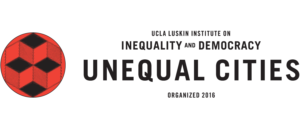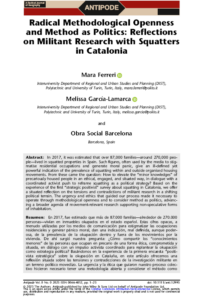Antipode
Co-authored by #UnequalCities Network members Mara Ferreri, Melissa García Lamarca, and Obra Social Barcelona
Abstract: In 2017, it was estimated that over 87,000 families—around 270,000 people—lived in squatted properties in Spain. Such figures, often used by the media to stigmatise residential occupations and generate moral panic, give an ill-defined yet powerful indication of the prevalence of squatting within and outside organised housing movements. From these came the question: How to elevate the “minor knowledges” of precariously housed people in an ethical, engaged, and situated way, in dialogue with a coordinated activist push to reframe squatting as a political strategy? Based on the experience of the first “strategic positivist” survey about squatting in Catalonia, we offer a situated reflection on the tensions and contradictions of militant research in a shifting political terrain. The urgency and ethics that guided our process made it necessary to operate through methodological openness and to consider method as politics, advancing a broader agenda of movement-relevant research supporting non-speculative forms of inhabitation.


